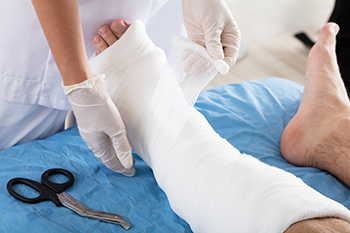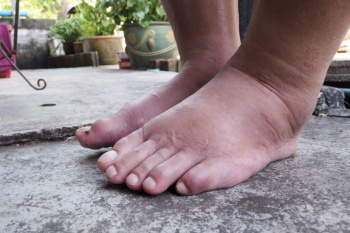
Maintaining foot safety in the workplace is essential for preventing injuries and ensuring overall comfort during long hours of standing or walking. Wearing the right shoes that provide proper support, fit well, and match the demands of the job can help reduce the risk of strain or accidents. Regularly inspecting footwear for signs of wear, such as thinning soles or damaged laces, is important to maintain protection and stability. Foot protection should always be used when working in environments with heavy objects or sharp materials, such as steel toe boots or puncture-resistant soles. Being aware of workplace hazards, including slippery surfaces, uneven flooring, or falling objects, helps employees take appropriate precautions. If you have sustained a foot or ankle injury while working, it is suggested that you promptly contact a podiatrist who can offer correct treatment solutions and help with work comfort on the job.
Preventing falls among the elderly is very important. If you are older and have fallen or fear that you are prone to falling, consult with Dr. Tupper from Coshocton Foot Health Center. Our doctor will assess your condition and provide you with quality advice and care.
Every 11 seconds, an elderly American is being treated in an emergency room for a fall related injury. Falls are the leading cause of head and hip injuries for those 65 and older. Due to decreases in strength, balance, senses, and lack of awareness, elderly persons are very susceptible to falling. Thankfully, there are a number of things older persons can do to prevent falls.
How to Prevent Falls
Some effective methods that older persons can do to prevent falls include:
- Enrolling in strength and balance exercise program to increase balance and strength
- Periodically having your sight and hearing checked
- Discuss any medications you have with a doctor to see if it increases the risk of falling
- Clearing the house of falling hazards and installing devices like grab bars and railings
- Utilizing a walker or cane
- Wearing shoes that provide good support and cushioning
- Talking to family members about falling and increasing awareness
Falling can be a traumatic and embarrassing experience for elderly persons; this can make them less willing to leave the house, and less willing to talk to someone about their fears of falling. Doing such things, however, will increase the likelihood of tripping or losing one’s balance. Knowing the causes of falling and how to prevent them is the best way to mitigate the risk of serious injury.
If you have any questions, please feel free to contact our office located in Coshocton, OH . We offer the newest diagnostic and treatment technologies for all your foot care needs.

Offloading devices are used to reduce pressure on specific areas of the foot where ulcers have formed, helping to prevent further damage and support healing. Offloading devices typically shift body weight away from the wound, which decreases friction and mechanical stress. Total contact casts provide the highest level of pressure relief by fully immobilizing the foot and ankle, making them effective for deep or persistent ulcers. For patients needing more flexibility, removable cast walkers not only offer protection but also allow access for wound inspection. Custom orthotics and specialized shoes with cushioned soles are often used for less severe ulcers or during the later stages of healing. Offloading sandals and pneumatic boots may help with minor ulcers by offering light support and comfort for indoor use. Choosing the right device depends on the size and depth of the ulcer, the location on the foot, and the patient’s ability to move independently. If you have foot ulcers that require wound care, it is suggested that you schedule an appointment with a podiatrist to see if offloading devices may work for you.
Wound care is an important part in dealing with diabetes. If you have diabetes and a foot wound or would like more information about wound care for diabetics, consult with Dr. Tupper from Coshocton Foot Health Center. Our doctor will assess your condition and provide you with quality foot and ankle treatment.
What Is Wound Care?
Wound care is the practice of taking proper care of a wound. This can range from the smallest to the largest of wounds. While everyone can benefit from proper wound care, it is much more important for diabetics. Diabetics often suffer from poor blood circulation which causes wounds to heal much slower than they would in a non-diabetic.
What Is the Importance of Wound Care?
While it may not seem apparent with small ulcers on the foot, for diabetics, any size ulcer can become infected. Diabetics often also suffer from neuropathy, or nerve loss. This means they might not even feel when they have an ulcer on their foot. If the wound becomes severely infected, amputation may be necessary. Therefore, it is of the upmost importance to properly care for any and all foot wounds.
How to Care for Wounds
The best way to care for foot wounds is to prevent them. For diabetics, this means daily inspections of the feet for any signs of abnormalities or ulcers. It is also recommended to see a podiatrist several times a year for a foot inspection. If you do have an ulcer, run the wound under water to clear dirt from the wound; then apply antibiotic ointment to the wound and cover with a bandage. Bandages should be changed daily and keeping pressure off the wound is smart. It is advised to see a podiatrist, who can keep an eye on it.
If you have any questions, please feel free to contact our office located in Coshocton, OH . We offer the newest diagnostic and treatment technologies for all your foot care needs.

Diabetes affects the body in many ways, and one common issue is swollen feet. High blood sugar levels can damage blood vessels and nerves, leading to poor circulation and fluid retention in the lower extremities. This swelling, known as edema, can cause discomfort and may increase the risk of infections and ulcers. Nerve damage, or neuropathy, can further complicate the issue by reducing sensation, making it difficult to notice injuries or pressure points. Poor circulation slows healing, increasing the likelihood of complications. Managing blood sugar levels, wearing supportive footwear, and elevating the feet can help reduce swelling. If you have diabetes and your feet are noticeably swollen, it is suggested that you are under the care of a podiatrist who can help you to manage this condition.
Diabetic foot care is important in preventing foot ailments such as ulcers. If you are suffering from diabetes or have any other concerns about your feet, contact Dr. Tupper from Coshocton Foot Health Center. Our doctor can provide the care you need to keep you pain-free and on your feet.
Diabetic Foot Care
Diabetes affects millions of people every year. The condition can damage blood vessels in many parts of the body, especially the feet. Because of this, taking care of your feet is essential if you have diabetes, and having a podiatrist help monitor your foot health is highly recommended.
The Importance of Caring for Your Feet
- Routinely inspect your feet for bruises or sores.
- Wear socks that fit your feet comfortably.
- Wear comfortable shoes that provide adequate support.
Patients with diabetes should have their doctor monitor their blood levels, as blood sugar levels play such a huge role in diabetic care. Monitoring these levels on a regular basis is highly advised.
It is always best to inform your healthcare professional of any concerns you may have regarding your feet, especially for diabetic patients. Early treatment and routine foot examinations are keys to maintaining proper health, especially because severe complications can arise if proper treatment is not applied.
If you have any questions please feel free to contact our office located in Coshocton, OH . We offer the newest diagnostic and treatment technologies for all your foot and ankle needs.


